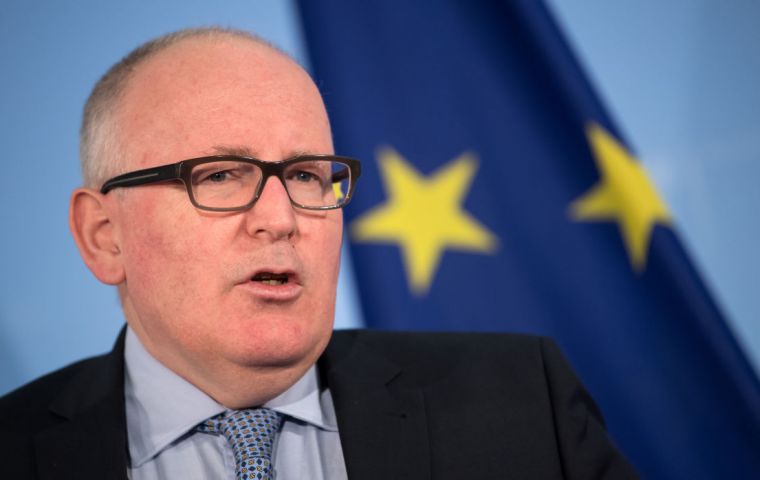MercoPress. South Atlantic News Agency
European Commission supports Madrid: “Catalonia has chosen to ignore the law”
 “The regional government of Catalonia has chosen to ignore the law in organizing the referendum of last Sunday,” said Franz Timmermans
“The regional government of Catalonia has chosen to ignore the law in organizing the referendum of last Sunday,” said Franz Timmermans Three full days after Catalonia’s controversial independence referendum, a top European Commission official finally spoke out about the issue tearing Spain apart. The Spanish government’s “proportionate use of force” was necessary to uphold the rule of law, Vice President Frans Timmermans said.
“The regional government of Catalonia has chosen to ignore the law in organizing the referendum of last Sunday,” he added. While Mr Timmermans sided with Madrid in condemning the poll, saying it violated the Spanish Constitution, his comments during a hastily-arranged European Parliament debate in Strasbourg were uncharacteristically blunt for the EU.
Until now, leaders across Europe have been mute about the Catalan independence bid. This position that Sunday’s vote was “not legal” comes after years of refusing to take a view on the campaign of Catalan separatists other than to insist it is an internal Spanish matter.
After the sight of riot police wielding batons and firing rubber bullets, the situation has escalated and the EU’s resolute silence has looked increasingly untenable. If they have commented on last weekend’s events – in while hundreds of independence protesters were injured in scuffles with the Spanish police – European leaders and officials have called for calm.
Surprisingly, Belgium’s Prime Minister Charles Michel spoke out on Monday, explicitly condemning violence, but implicitly pointing to the Spanish authorities: as the head of a coalition government with Flemish separatists, he faces his own independence threats.
Even in Strasbourg, where MEPs rarely miss the chance to make melodramatic statements, Wednesday’s debate was carefully constrained. It was limited to discussion about “the rule of law and fundamental rights in Spain in light of the events in Catalonia” after an intervention by the European People Party, the largest political group, which includes Spanish Prime Minister Mariano Rajoy’s Popular Party.
Ironically, the Catalan government has suggested that the EU could be a mediator in its negotiations with Madrid. The Catalan government’s representative in Brussels Amadeu Altafaj says that if the EU is not able to protect 7.5 million of its citizens from violence and repression, “it will fail not only to them but to the whole Union.”
Catalan President Carles Puigdemont also wants the EU to trigger a mechanism known as Article 7 which would suspend the membership rights of Spain on the grounds that it has breached EU values like the respect for human rights or the rule of law. But there is little chance the EU will use this ‘nuclear option’, according to Camino Mortera-Martinez, a research fellow at the Centre for European Reform think tank




Top Comments
Disclaimer & comment rules-

-

-

Read all commentsIn the news: A United Nations spokesperson today revealed that the international body would suspend indefinitely the application of its human rights and self-determination policies for northern Spain, in order to ensure Madrid's fascist government a continuing supply of allioli, pa amb tomaquet, and money.
Oct 05th, 2017 - 02:12 pm +5Meanwhile, Argentina's Ministerio de Relaciones Exteriores y Culto is insisting that the catalans are an implanted group and do not qualify as a “people.” And that a mere 7.5 million residents is “ too small” for self-government.
General Francisco Franco, looking tanned and rested, emerged from a conference with the Falange Española Tradicionalista y de las Juntas de Ofensiva Nacional Sindicalista, telling reporters that Spain was expecting continued assistance from Germany and Italy, just as in the old days. When asked whether Moroccan troops would again be utilised, General Franco interrupted his humming of Cara al Sol to indicate that all repressive measures were on the table.
@Voice
Oct 05th, 2017 - 08:42 pm +3Totally agree; it wasn't proportional at all and no force was even necessary. They can declare the vote illegal and the results void, there was no reason to use violence to try and stop people voting.
You'd think they'd learn from other countries' mistakes, or do they think they just weren't oppressive enough?
“The Spanish government’s “proportionate use of force” was necessary to uphold the rule of law,”
Oct 05th, 2017 - 08:02 pm +2We all saw the news footage “proportionate use of force” my arse...and any use of force to stop people voting was unnecessary...
The Spanish Govt could have let them vote and still just claimed it was illegal...what did the use of force achieve...nothing...
It's a democratic right to vote...but then again Spain is hardly democratic...it wasn't long ago they were fascist...
Commenting for this story is now closed.
If you have a Facebook account, become a fan and comment on our Facebook Page!